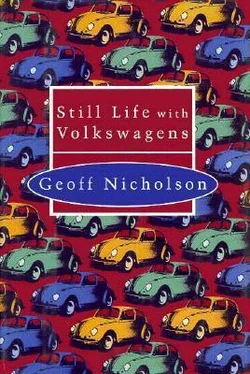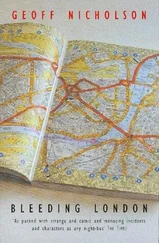He goes on, crossing and recrossing the country, driving on motorways and A roads and B roads, on urban clearways and country roads and single tracks with passing places, visiting cities and villages, passing through new towns and conurbations and seaside resorts. Sometimes at night he finds a quiet, lonely spot and sleeps in the back of Enlightenment, but Marilyn sent him on his way with a healthy chunk of money, and there are nights that he spends in a motorway Travel Lodge or hotel.
Sometimes he feels lonely. There are times when he wouldn’t mind having a little company: and given the choice, he would, of course, always choose Marilyn as his companion. Sometimes he sends her a postcard. She has given him her address and it sounds very fancy indeed. She says she’s staying at a friend’s place and he’s pleased that she has such generous friends. The simple act of writing to her helps stave off the loneliness.
There are also times when he feels a little guilty about using up fossil fuels and polluting the atmosphere in his search, but somehow he can cope with the guilt. The quest is everything. He knows, with an unshakeable certainty, that he will find Marilyn’s father. And once he’s found him it will all happen. Marilyn will be happy, and then she will surely take him to her heart. She will be grateful and she will love him because of what he has done for her. They will then be happy together; perfected, elevated and enlightened. And if it requires a little bit of air pollution, a touch of global warming, to bring about that end, then so be it. Barry puts the pedal to the metal and motors on.
♦
Carlton Bax sits in darkness. He is being kept in the dark, in isolation, in captivity. He is blindfolded by bands of hot, thick, woollen cloth, and his hands are tied behind him. His legs are free so that he can stand and he can walk, but there is nowhere for him to go. He has paced the room, measured it out, and it is less than four paces in either direction. There is no chair, no bed. It is an airless place, a basement or cellar he thinks, a place without windows or fresh air, and increasingly it smells of himself, of his bodily waste. At first he thought he would never be able to sleep here because of the cold, the discomfort and his own anxiety, but it is amazing what changes exhaustion can bring.
He tries to listen for clues, something that will tell him where he is; voices perhaps or music or birds, but all he can hear is a distant and unidentifiable rumbling. Food arrives at irregular intervals and at that time someone unties his hands, though the blindfold always remains in place. He feeds himself and uses the slop bucket if necessary and then he’s retied and left alone again. The man who brings the food, who unties his hands, never says a word, and yet Carlton feels that he knows his jailer. It is always the same person, a man, someone young but heavy and slow-moving, someone whose breath sometimes smells of cigarettes and sometimes of onions. Occasionally Carlton will try to make conversation but there is never any reply. This is not the one who does the talking. The one who does speak, who asks the questions, is someone quite different, someone older, surer of himself, someone far more confident and frightening.
Carlton Bax hasn’t been beaten, not really. He certainly hasn’t been hurt. He was kicked and punched a little at the beginning, but it felt like a warning not a methodology. And then the interrogation began. A man’s voice — dry and strong and very patient — kept asking, still asks, the same things over and over again. And Carlton Bax makes the same replies over and over again.
“Where is it?”
“Where’s what?”
“You know what I mean.”
“No I don’t.”
“The Volkswagen. Where’s the Volkswagen?”
“Which Volkswagen? I own dozens of Volkswagens.”
“You know which Volkswagen.”
“No I don’t.”
“I think you do.”
“No I don’t.”
“I think you’ll tell us sooner or later.”
“I won’t. I can’t. I don’t know what you’re talking about.”
And so it goes on, so it repeats itself. A series of meetings, of interviews, interrogations, always the same, the same steady voice with the same questions, Carlton Bax’s own voice becoming increasingly plaintive, saying nothing, admitting nothing. Carlton doesn’t see where this can go, nor where it will end.
Will they soon begin to beat him in earnest? Will there be torture with cigarettes and ice and electricity? Will they cut off a finger, or a testicle? Will they kill him when they finally decide he isn’t going to tell them what they think he knows? And who are ‘they’? Are they just criminals? Opportunist kidnappers? Or is there some wider brief, and is his kidnapping part of some greater, grander movement?
Surely, he thinks, there must be people out there looking for him by now; police, his family, Marilyn. He wonders how she is, whether she misses him as much as he’d like her to. He thinks of his gentleman’s residence and his magnificent collection of Volkswagen memorabilia, and it all becomes too much to bear. Tears form in his eyes but the black blindfold won’t let them fall. It absorbs them completely.
He tries to imagine a future, a time when all this will be over. He walks round the room, slowly but as if with a purpose, and he walks straight into the slop bucket. It falls over. Piss and shit mark the floor of the room like streams and islands; but he cannot see this. He stands motionless now and listens, and he realises that the strange rumbling he can hear, muffled and up above the head, is the sound of heavy traffic.
♦
The phone rings. Marilyn answers. “Hello,” she says eagerly, urgently, hope and desperation twined around her voice. At first nobody speaks at the other end. Could it be? She says, “Carlton?”
“No. It’s me. Ishmael.”
“Oh. Hello Barry. Have you found my father yet?”
“I’m afraid not.”
“Are you getting warm?”
“Well, I could be.”
“Where are you?”
“I’m on the road.”
“Don’t be tiresome, Barry.”
“I’m out there. I’m white-lining, I’m on the hard-shoulder, on the speed limit. I’m following my inner directives.”
“And this is going to help you find my father?”
“Let me put it this way, Marilyn; the path of indirections leads to the same destination as the hasty shortcut.”
“Are you on something, Barry?”
“I’m on the road.”
“Of course you are. I know that. Why did I bother to ask?”
“It’s all right Marilyn. I’m following a course of random moves.”
“Oh great.”
“It is. You see we’re all heading for the same place. All of us. It’s just a question of finding where the paths cross. Once I’ve done that I’ll be right where your father is.”
“Is this really going to work, Barry?”
“Yes. It has to. I know that if I don’t find your father then you’ll think less of me. I couldn’t bear to have you think less of me.”
“Stay in touch, Barry,” she says, the hope having largely been erased from her voice, the desperation taking over.
“Call me Ishmael,” he says. “Please.”
Marilyn soon discovers something of the nature of his random moves. He starts sending her postcards. They reveal a strange and erratic progress. She receives picture postcards of Canterbury, St Ives, Fleetwood, the M52 at Huddersfield. However, the photograph on the front never matches the postmark on the back. A postcard of the Salcombe foot ferry arrives from Staffordshire. A postcard of the Birmingham University Students’ Union building is sent from Alnwick. Barry’s messages are brief but suitably opaque. “All roads are one,” he writes, “with the possible exception of the M18.” He writes, “Greetings from the crawler lane.” He writes, “There are serious delays on the motorway to sapience.” Marilyn is getting fed up.
Читать дальше












